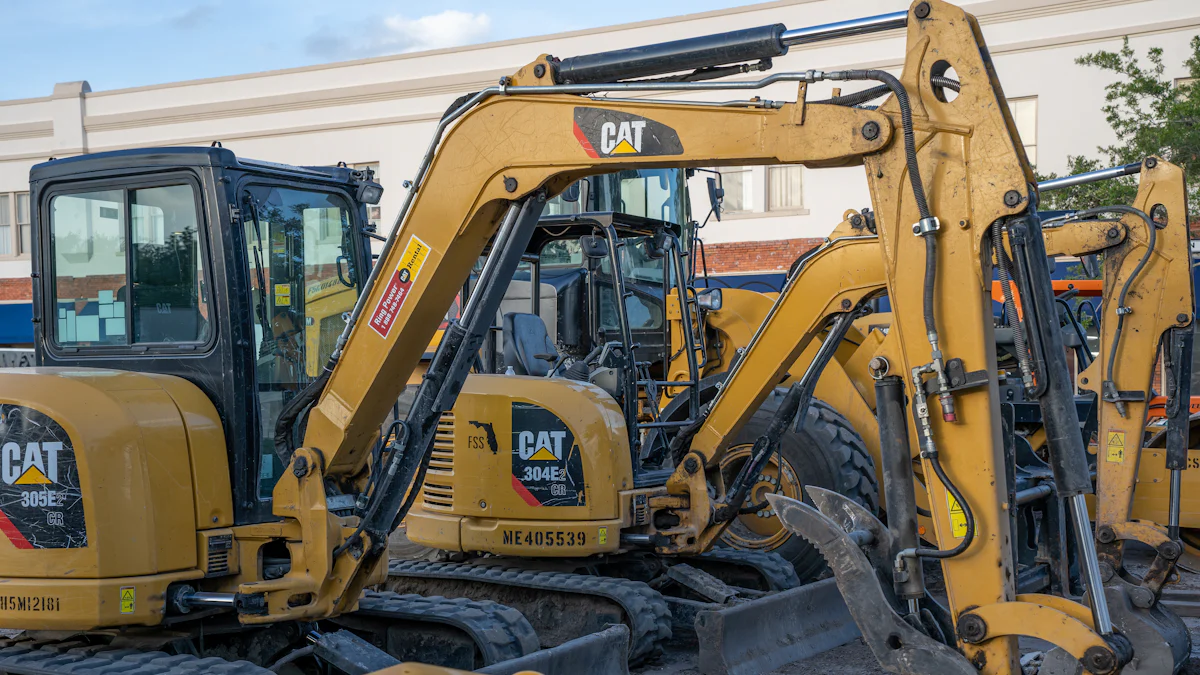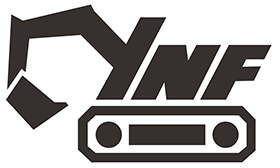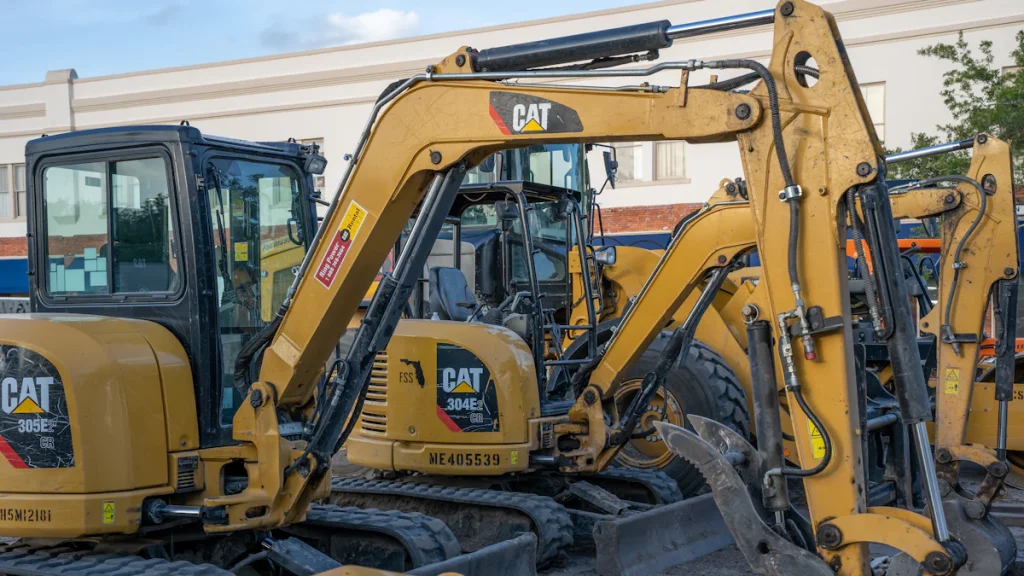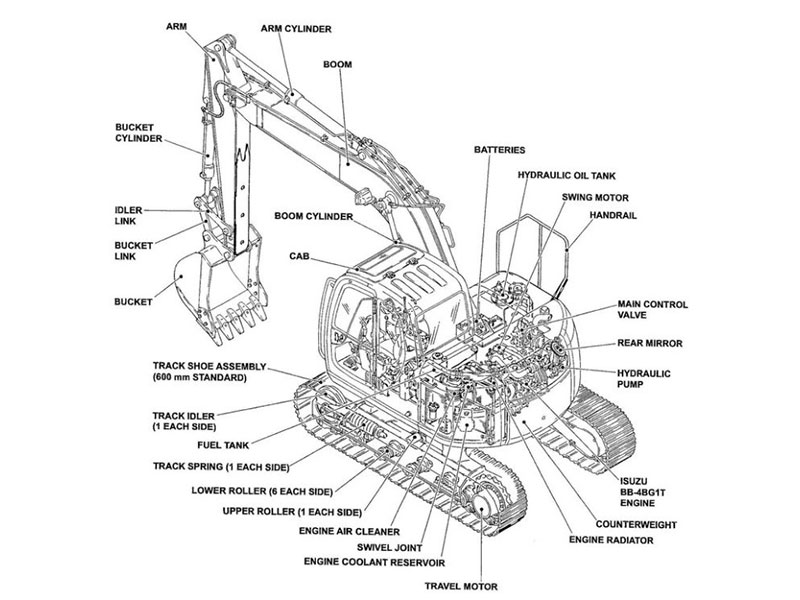
Mini excavators depend on their hydraulic system to deliver power and precision. Without proper care, issues like oil leaks, high temperatures, or seal failures can disrupt performance. Contaminated hydraulic fluid often damages seals and other excavator components, while worn hydraulic lines or aging seals lead to leaks. Filters play a critical role in keeping hydraulic fluid clean, preventing costly breakdowns. By understanding the main parts of an excavator, such as pumps, cylinders, and hoses, you can ensure your machine operates efficiently. Regular maintenance of mini excavator hydraulic parts keeps your equipment reliable and productive.
Key Takeaways
Taking care of hydraulic parts, like pumps and cylinders, is important for mini excavators to work well.
Check hydraulic seals often to stop leaks and keep them working properly; replace damaged seals quickly.
Use good-quality hydraulic parts from reliable brands like YNF Machinery to make your excavator last longer and work better.
Keep hydraulic fluid clean and at the right level to prevent dirt and damage to the system.
Learn how each hydraulic part, like pumps, cylinders, and hoses, works to keep the excavator running smoothly.
Hydraulic Pump: The Heart of the Mini Excavator Hydraulic System

Function and Importance of Hydraulic Pumps
The hydraulic pump plays a central role in the operation of a mini excavator. It generates the flow and pressure needed to power the excavator hydraulic system. Without it, the machine cannot perform essential tasks like digging, lifting, or moving materials. The pump ensures that hydraulic fluid reaches the cylinders and motors, enabling precise and efficient movement.
Excavators often use multiple hydraulic pumps to meet higher flow requirements. This design enhances operational efficiency, allowing the machine to handle demanding tasks with ease. Selecting the right hydraulic pump is critical. It directly impacts the performance, efficiency, and lifespan of your mini excavator. Advanced pumps, such as piston pumps, are now widely used due to their high-pressure capabilities and durability. These pumps are particularly effective in open-loop hydraulic systems, which are common in modern excavators.
Maintenance Tips for Hydraulic Pumps
Proper maintenance of the hydraulic pump is essential to keep your mini excavator running smoothly. Start by checking the hydraulic fluid regularly. Contaminated or low fluid levels can damage the pump and other parts of an excavator. Replace filters as recommended to prevent debris from entering the system. Inspect the pump for signs of wear, such as unusual noises or reduced performance. Addressing these issues early can prevent costly repairs.
Keep an eye on the pump’s seals and connections. Leaks can lead to a drop in pressure, affecting the efficiency of the mini excavator hydraulic system. Regularly clean the pump and surrounding components to avoid dirt buildup, which can cause overheating. Following these steps will extend the life of your hydraulic pump and maintain the reliability of your excavator.
YNF Machinery’s High-Quality Hydraulic Pumps
YNF Machinery offers top-notch hydraulic pumps designed for mini excavators. These pumps are built to deliver exceptional performance and durability. They feature advanced technology, including electronic control systems and load-sensing capabilities, which optimize energy use and improve efficiency. YNF Machinery ensures that each pump meets rigorous quality standards, providing reliable solutions for your excavator hydraulic system.
The hydraulic pumps from YNF Machinery are compatible with a wide range of excavator models. They are engineered to minimize torque loss and leakage, ensuring smooth operation. With a focus on durability, these pumps withstand harsh conditions, making them ideal for demanding applications. By choosing YNF Machinery, you gain access to high-quality mini excavator hydraulic parts that enhance the performance and longevity of your equipment.
Hydraulic Cylinders: Key Components in the Mini Excavator Hydraulic System
Function and Role of Hydraulic Cylinders
Hydraulic cylinders play a vital role in the operation of your excavator. These components convert hydraulic energy into mechanical force, enabling the machine to perform various tasks. Each cylinder in the excavator serves a specific purpose:
Boom Cylinder: Lifts and lowers the boom, allowing the excavator to reach higher or deeper areas.
Arm Cylinder: Controls the stick’s movement, providing flexibility for digging and material handling.
Bucket Cylinder: Powers the bucket’s motion, enabling scooping, lifting, and dumping materials.
Swing Cylinder: Rotates the upper part of the excavator, helping you change directions efficiently.
Dozer Cylinder: Moves the dozer blade, assisting in pushing materials and stabilizing the machine.
These cylinders work together to ensure your excavator operates smoothly and efficiently, making them indispensable parts of an excavator.
Maintenance Tips for Hydraulic Cylinders
Proper maintenance of hydraulic cylinders ensures the longevity of your excavator. Start by inspecting the cylinders regularly for signs of wear, such as seal failure, corrosion, or rod damage. Side-loading and fluid contamination can also cause significant issues. Address these problems promptly to avoid costly repairs.
Keep the hydraulic fluid clean to prevent contamination, which can damage the seals and other components. Replace worn-out seals immediately to maintain the efficiency of the excavator hydraulic system. Overheating can also harm the cylinders, so monitor the system’s temperature during operation. Regular cleaning of the cylinders and surrounding areas reduces the risk of dirt buildup, which can lead to corrosion.
By following these steps, you can keep the hydraulic system in top condition and minimize downtime.
Hydraulic Cylinder Seal Kits by YNF Machinery
YNF Machinery offers high-quality hydraulic cylinder seal kits designed to prevent oil leaks and maintain the efficiency of your excavator. These kits are made from durable materials like NBR and FKM, ensuring they withstand shocks, vibrations, and extreme conditions. They provide a tight seal, preventing contamination and ensuring smooth operation.
The seal kits are available in various sizes to fit different excavator models, including popular brands like Caterpillar and Kubota. Their precise manufacturing ensures perfect alignment, reducing the risk of misalignment and subsequent damage. With YNF Machinery’s seal kits, you can enhance the performance and lifespan of your mini excavator hydraulic parts.
Hydraulic leaks not only waste resources but also harm the environment by contaminating soil and water sources. Using reliable seal kits minimizes leaks, reducing environmental impact and improving the sustainability of your operations.
Hydraulic Hoses and Fittings: Vital Parts of an Excavator

Function and Importance of Hydraulic Hoses and Fittings
Hydraulic hoses and fittings are essential for transferring hydraulic fluid between components in your excavator. These parts ensure the hydraulic system operates efficiently by maintaining consistent pressure and flow. Properly routed hoses minimize sharp bends and flow restrictions, which improves the overall performance of your machine. Engineers design hose layouts to avoid durability and serviceability issues, ensuring long-term reliability.
The materials used in hydraulic hoses contribute significantly to their performance. Common materials include:
Material | Description |
|---|---|
Rubber | Provides flexibility, resistance to wear, abrasion, and extreme weather conditions. |
Steel | Used for reinforcing layers, giving strength to withstand high pressure. |
Synthetic Fibers | Lightweight and durable, resistant to fatigue, ideal for long-lasting performance in hydraulic systems. |
These materials ensure that hydraulic hoses can handle the high pressures and temperatures required in excavators. Additionally, fittings like screw-on connections maintain pressure without leaks, ensuring smooth oil flow. Quick couplings, while convenient, may restrict flow due to smaller diameters, potentially affecting attachments.
Maintenance Tips for Hydraulic Hoses and Fittings
Regular maintenance of hydraulic hoses and fittings prevents costly breakdowns and safety risks. Inspect hoses for cracks, bulges, or leaks. Replace damaged hoses immediately to avoid high-pressure fluid leaks, which can cause serious injuries or environmental contamination. Check fittings for tightness and signs of wear, as loose or worn fittings can lead to oil leaks.
Keep hoses clean and free from dirt or debris. Contaminants can damage the hydraulic system and reduce efficiency. Ensure proper hose routing to avoid sharp bends or kinks, which can weaken the hose over time. Following these steps will extend the lifespan of your excavator’s hydraulic hoses and fittings.
Durable Hydraulic Hoses from YNF Machinery
YNF Machinery provides high-quality hydraulic hoses designed for durability and performance. These hoses are made from materials like synthetic rubber and Teflon, offering resistance to high temperatures, abrasions, and chemicals. Their robust construction ensures they can withstand the demanding conditions of excavator operations.
The hydraulic hoses from YNF Machinery meet international standards like SAE J517, ensuring compatibility and reliability. They are available in various sizes to fit different excavator models, making them a versatile choice for your hydraulic system. By choosing YNF Machinery, you can enhance the efficiency and longevity of your mini excavator hydraulic parts while reducing maintenance costs.
Tip: Recycling old hydraulic hoses helps recover valuable materials and reduces environmental impact. Proper disposal prevents soil and water contamination caused by residual hydraulic fluid.
Control Valves: Precision in the Mini Excavator Hydraulic System
Function and Role of Control Valves
Control valves are essential components in the hydraulic system of a mini excavator. They regulate the flow and pressure of hydraulic fluid, ensuring precise operation of the machine. These valves allow you to control the movement of various parts of an excavator, such as the boom, arm, and bucket, with accuracy. The main control valve plays a critical role by distributing hydraulic fluid to different components, enabling smooth and efficient operation.
Different types of control valves serve specific purposes. For example:
Valve Type | Description |
|---|---|
Main Control Valve | Controls the flow of hydraulic fluid and distributes it to different parts. |
Directional Valves | Control the direction of hydraulic fluid flow in the system. |
2/2-way Valves | Two flow pipe connections, switches between two positions. |
3/2-way Valves | Three flow pipe connections, switches between two positions. |
4/3-way Valves | Four flow pipe connections, switches between three positions. |
6/2-way Valves | Six flow pipe connections, switches between two positions. |
8/3-way Valves | Eight flow pipe connections, switches between three positions. |
Directional valves, in particular, are vital for controlling the direction of hydraulic fluid flow. This precision is crucial for tasks requiring accuracy, such as digging or material handling.
Maintenance Tips for Control Valves
Proper maintenance of control valves ensures the reliability of your excavator. Regularly inspect the main control valve for signs of wear or malfunction. Clean or replace filters to prevent debris from clogging the system. Check safety release valves to ensure they maintain appropriate pressure levels. Addressing these issues promptly prevents costly repairs and downtime.
Common problems include clogged filters, spring failures in safety valves, and wear in the main control valve. You can avoid these by keeping the hydraulic fluid clean and replacing worn components as needed. Regular maintenance keeps the hydraulic system efficient and extends the lifespan of your mini excavator hydraulic parts.
YNF Machinery’s Reliable Control Valve Solutions
YNF Machinery offers high-quality control valves designed for precision and durability. These valves meet international standards and are compatible with various excavator models. Their robust construction ensures reliable performance, even in demanding conditions. YNF Machinery also provides advanced solutions, such as electro-hydraulic remote control systems, which enhance operational efficiency and safety.
By choosing YNF Machinery, you gain access to innovative control valves that improve the accuracy and reliability of your excavator. These valves help you maintain smooth operations, reduce maintenance costs, and extend the lifespan of your equipment.
Tip: Upgrading to modern control valves with load-sensing capabilities can enhance the efficiency of your hydraulic system while reducing energy consumption.
Hydraulic Seals: Ensuring Efficiency in the Excavator Hydraulic System
Function and Importance of Hydraulic Seals
Hydraulic seals play a crucial role in maintaining the efficiency of your excavator’s hydraulic system. These seals prevent fluid leaks, ensuring that hydraulic pressure remains consistent for optimal performance. They also keep contaminants like dirt and dust out of the system, protecting internal components from damage. Without effective seals, your excavator may experience reduced efficiency, increased wear, and costly downtime.
Different types of hydraulic seals serve specific purposes:
O-rings provide reliable static sealing.
Back-up rings prevent extrusion under high pressure.
V-rings maintain sealing on rotating parts.
Oil seals keep oil contained and contaminants out.
Piston seals ensure a tight seal between the piston and cylinder.
Lip seals function similarly to piston seals but in one direction.
Wiper rings block dirt and debris from entering hydraulic cylinders.
These seals work together to ensure your excavator operates smoothly and efficiently.
Maintenance Tips for Hydraulic Seals
Proper maintenance of hydraulic seals can extend their lifespan and prevent leaks. Regularly inspect seals for signs of wear, such as cracks, brittleness, or deformation. Keep the hydraulic system clean to avoid contamination, which can weaken seals. Use the correct hydraulic fluid to ensure compatibility with the seal material.
Common causes of seal failure include high temperatures, dryness, improper installation, and excessive pressure. Address these issues by monitoring system pressure, applying lubricant during installation, and following manufacturer guidelines. Performing regular leak tests can help you identify problems early, reducing the risk of costly repairs.
Cause of Failure | Explanation |
|---|---|
High Temperatures | Harden seal material, causing brittleness and cracking. |
Dryness & Stress | Insufficient lubrication or excessive load damages the seal lip. |
Bad Installations | Cuts or dents during installation reduce efficiency and allow contamination. |
Pressure & Poor Materials | High backpressure or low-quality materials lead to fractures. |
Dirt Contamination | Weakens seals and allows dirt into the hydraulic system. |
Fluid/Seal Incompatibility | Incompatible fluids cause seals to lose elasticity and effectiveness. |
Hydraulic Oil Seals by YNF Machinery
YNF Machinery offers high-quality hydraulic oil seals designed to enhance the performance of your excavator. These seals are made from durable materials like nitrile rubber, polyurethane, and silicone, ensuring resistance to extreme temperatures, high pressures, and chemical exposure. Their precise design prevents leaks and contamination, maintaining the integrity of your hydraulic system.
The seals are available in various sizes and shapes, making them compatible with different excavator models. YNF Machinery’s oil seals are easy to install and maintain, reducing downtime and maintenance costs. By choosing these seals, you ensure the efficiency and longevity of your excavator’s hydraulic system, keeping your equipment reliable and productive.
Tip: Regularly check hydraulic fluid levels and monitor system pressure to prevent seal leaks and maintain optimal performance.
A well-maintained hydraulic system ensures your excavator operates efficiently and reliably. Key parts of an excavator, like pumps, cylinders, hoses, control valves, and seals, play a vital role in its performance and longevity. Regular maintenance, such as checking fluid levels, inspecting for leaks, and replacing worn components, prevents costly breakdowns and extends the lifespan of your equipment. Investing in high-quality hydraulic parts from YNF Machinery reduces downtime and enhances productivity. By prioritizing maintenance and quality, you optimize your excavator’s performance and minimize long-term costs.
FAQ
What are the most important hydraulic parts in an excavator?
The most important hydraulic parts include the pump, cylinders, hoses, control valves, and seals. These components work together to ensure the excavator operates efficiently and performs tasks like digging, lifting, and moving materials.
How often should you inspect hydraulic parts of an excavator?
Inspect hydraulic parts regularly, ideally every 250 hours of operation. Look for leaks, wear, or damage. Early detection of issues helps maintain performance and prevents costly repairs.
Why do hydraulic seals fail in excavators?
Hydraulic seals fail due to high temperatures, contamination, or improper installation. Using the wrong hydraulic fluid or exposing seals to excessive pressure can also cause damage.
How can you prevent hydraulic leaks in your excavator?
Prevent leaks by maintaining clean hydraulic fluid, replacing worn seals, and inspecting hoses for cracks or bulges. Proper installation and regular maintenance reduce the risk of leaks.
What makes YNF Machinery’s hydraulic parts reliable?
YNF Machinery provides durable hydraulic parts made from high-quality materials. Their products meet international standards, ensuring compatibility and long-lasting performance for various excavator models.





